
Fast, affordable Internet access for all.

From Colorado to Texas, municipal broadband providers continue to rack up industry accolades, not just for delivering fiber service–the gold standard of Internet connectivity–but for these networks’ ability to provide ubiquitous access across an entire community at affordable rates.
The National Association of Telecommunications Officers and Advisors (NATOA) recently announced that its Community Broadband Projects of the Year Awards for 2023 will go to the Connexion network in Fort Collins, Colorado and TeamPharr.net in Pharr, Texas.
Awarding Community-Wide Access and Affordability
The Fort Collins award is in recognition for the city having established “a municipal broadband utility created by and for the community to improve the life of all 80,000 residential and commercial properties of Fort Collins through better, more affordable Internet,” NATOA said in announcing the award.
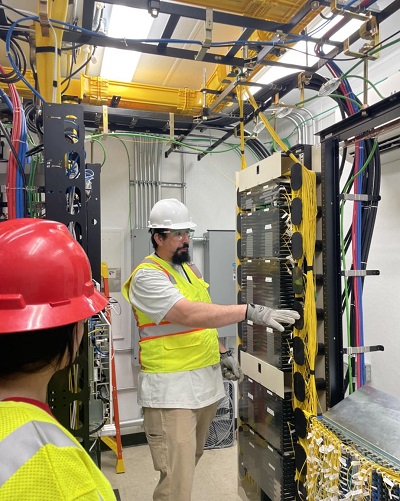
But it wasn’t just because Fort Collins’ network provides city-wide access to fiber. The award also recognizes that “Connexion offers the fastest Internet speeds available at affordable prices (emphasis added) as well as competitive phone and TV services.”
Loveland’s municipal broadband utility Pulse is a heartbeat away from expanding into a small neighboring Colorado town eager to offer its residents the same attractive, high-quality Internet access that can be found in Larimer County’s biggest cities.
Officials in Loveland and Timnath, Colorado (pop. 7,800) recently announced the ratification of an Inter-Governmental Agreement (IGA) that greenlight’s a plan to bring ubiquitous, affordable high-speed Internet access to yet another community in the Centennial State, as an increasing number of Colorado cities and towns embrace municipal broadband after years of frustration with the inadequate, high-priced service from the region’s monopoly incumbents.
"The selection of Pulse as our broadband service provider reflects a thorough process of assessment and consideration,” Timnath Town Planner Brian Williamson said in a press statement after the agreement was approved. “We are excited to work together, leveraging their expertise to ensure our residents have access to reliable, high-speed Internet that will contribute to the growth and prosperity of Timnath."
Keeping Up With The Loveland’s
This week Williamson spoke to ILSR about the project and why a town-wide fiber network is such valuable and vital infrastructure.
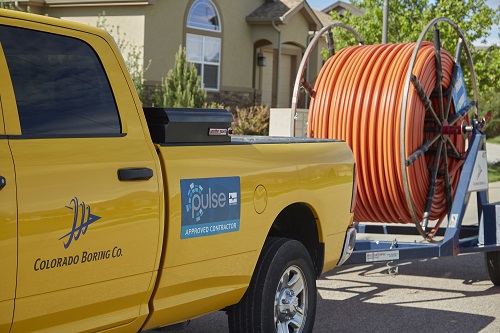
“Timnath is an interesting place. We are predominantly a residential community and we are growing quickly,” he said, adding that in a post-pandemic world of distance learning, remote work, and telehealth, an important part of the mix when people decide where to live and work is whether that community has reliable and affordable high-speed Internet access.

This week on the podcast, Christopher speaks with Brieana Reed-Harmel, Municipal Fiber Manager for the City of Loveland, located in Colorado’s Northern Front Range about an hour north of Denver. The city is home to over 80,000 residents as well as a municipal fiber broadband network called Pulse.
Chris and Brieana discuss Loveland’s population expansion over the past few years and Pulse’s resulting plans to extend beyond city limits into the “urban fringe,” which is more difficult to receive grant funding to serve. Brieana shares the ways in which the municipal network has leveraged its relationships, having partnered with its local school district to connect unserved areas during the pandemic, and currently in conversation with the county, which will help Loveland with the matching funds it needs for upcoming grant expansions. Brieana speaks to the challenges of building out the network through inflation and the pandemic. She stresses the importance of having a solid business model and great project management, as well as the scrappiness and ongoing investment needed to ensure a municipal network is sustainable and can bring residents quality connectivity at the best value.
This show is 25 minutes long and can be played on this page or via Apple Podcasts or the tool of your choice using this feed.
Transcript below.
We want your feedback and suggestions for the show-please e-mail us or leave a comment below.
Listen to other episodes here or view all episodes in our index. See other podcasts from the Institute for Local Self-Reliance here.
Thanks to Arne Huseby for the music. The song is Warm Duck Shuffle and is licensed under a Creative Commons Attribution (3.0) license.
Decorah, Iowa is moving forward on a long-percolating plan to expand the city’s core fiber ring to provide affordable broadband access to long-neglected residents and businesses.
While the project has been discussed for years, local officials tell ISLR the project gained renewed momentum during peak COVID, and is creeping closer to launch.
Contracts are still being finalized as the city hopes to spend somewhere around $12 to $15 million to deliver fiber to all 3,000 potential subscriber locations. The full project would take about three years to deliver fiber to all 7,740 city residents, with the first subscribers potentially coming online this fall.
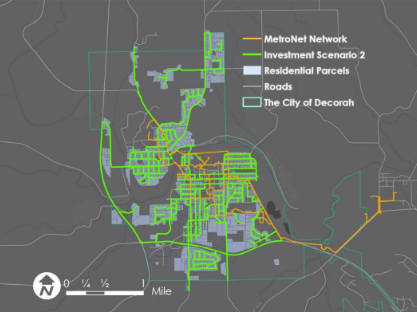
“Decorah has been in pursuit of fiber to the premises for the last 8 to 9 plus years and we finally have broken through some of our challenges on how to get to the finish line,” Chopper Albert, Decorah IT Director told ISLR.
According to Albert, Decorah’s recent progress is thanks in part to new City Manager Travis Goedken, who has long advocated for expanding the city’s existing fiber network to drive affordable fiber access citywide.
New City Management Team Pushes Forward
Since 2013 the city has owned an 11-mile core fiber network, dubbed the Decorah MetroNet. MetroNet was born out of frustration after a major flood in 2008 across much of Iowa resulted in prolonged communications network outages.
MetroNet (not to be confused with the Indiana-based ISP that goes by the same name) currently provides access to Luther College and 18 additional government buildings and anchor institutions.
*In partnership with Broadband Breakfast, we occasionally republish each other's content. The following Broadband Breakfast report was originally published here.
The American Association for Public Broadband is calling for industry help in creating a handbook that helps communities examine their option to create and maintain public broadband networks.
The handbook will be a “hands-on, high-level resource for moving through the entire process including getting started, building community support, technology and business case analysis, role of partners and finance,” said Gigi Sohn, executive director at AAPB.
Sohn asked for leaders for public broadband networks, including both government-owned and cooperatives to complete a public broadband inventory. AAPB will sort through the submissions and select folks to interview for more details.
The inventory asks for network elements, public benefits of the network, what financing has been used to build and operate the network, among other questions. Respondents can indicate whether the data in the survey is available to be publicly released or not.
The AAPB will consider how it can fully capture value from this inventory and may decide to include all or much of it online in a database.
Responses are required by Friday, September 8, 2023.
Vendors, consultants, and other leaders in public broadband are invited to share the survey with those that are eligible to respond.
For over 20 years, the city of Palo Alto, the "Birthplace of Silicon Valley,” has flirted with the idea of building a city-owned municipal fiber network. Now after years of debate, numerous studies, several false starts, and many unfulfilled RFPs, city officials say they’re finally moving forward with a city-owned fiber network they hope will transform affordable broadband connectivity citywide.
Palo Alto officials tell ILSR that the project will be spearheaded by the city-utility, and deployed in coordination with a major upgrade of the city’s electrical systems. Phase One of the city’s planned fiber deployment should begin later this year, delivering fiber access to around 20 percent of the city–or 6,500 homes and businesses.
Phase One will be funded entirely from the utility’s existing cash reserves. Profits from that deployment will then be used to expand affordable, multi-gigabit fiber access to all of the city’s 63,210 residents. Though no shortage of challenges remain.
A Long Time Coming
That Palo Alto residents have been clamoring for better, more affordable alternatives to regional telecom monopolies for 25 straight years speaks for itself. The high costs, slow speeds, and abysmal customer service of regional telecom giants AT&T and Comcast have long driven the public’s unflagging interest in better, cheaper connectivity options.
After years of strategizing, Waterloo, Iowa officials announced in February that they were moving forward with their plan to create a new utility aimed at delivering affordable fiber to every last city resident. While the resulting network is still very much in the planning and construction phase, officials this month released a new website for the project revealing service pricing.
According to the Waterloo telecommunications board, locals will have access to symmetrical 300 megabit per second (Mbps) service, symmetrical 1 gigabit per second (Gbps) service, and symmetrical 10 Gbps service for $50 a month, $70 a month, and $110 a month, respectively. The offerings will see no long-term contracts or usage caps.

Unlike many municipalities, Waterloo is also offering both phone and television bundles. Phone and TV service bundled with 1 Gbps service will cost locals $180 per month, while phone and TV service bundled with 10 Gbps service will be $224 per month.
Andy Van Fleet, chairperson of the board of trustees, tells the Waterloo Cedar Falls Courier that the pricing is notably lower than the prices charged by regional cable monopoly Mediacom. Van Fleet told the paper that Mediacom currently charges him $129 a month for 300 Mbps service, plus the added costs incurred by technically unnecessary usage caps and overage fees.
Edison, New Jersey is proceeding with the construction of an affordable, gigabit-capable fiber network after receiving $2 million cash infusion from state leaders. The resulting network will be built on the back of decades’ worth of local frustration with the high prices, spotty availability, and slow broadband speeds provided by regional monopolies.
The city spent $36,750 on a feasibility study in 2022 to determine the plausibility of building a citywide fiber network. The resulting study by Matrix Design Group found that 87 percent of Edison locals would likely switch to a city-owned and operated fiber network if the option existed.
Edison’s network is in the early stages of planning, and city leaders are only just starting to field competing bids from consulting vendors who’ll then draft a more comprehensive business plan.
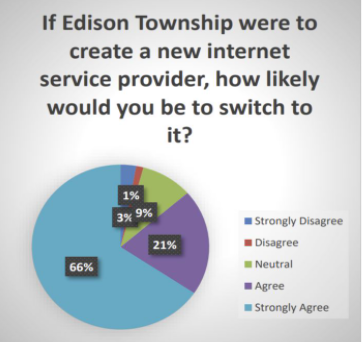
In the interim, the city has received $2 million as part of the New Jersey fiscal year 2024 budget to help get the proposal off the ground.
"Access to the Internet is no longer a luxury, it’s a necessity,” State Senator Patrick Diegnan, Assemblyman Robert Karabinchak and Assemblyman Sterley Stanley said of the funding. “We commend Mayor Sam Joshi for making high-speed municipal broadband a priority for Edison."
In a post last year made to social media, Joshi detailed the city’s longstanding frustration with regional telecom monopoly Optimum, owned by French telecom giant Altice.
Portland activists are renewing their calls to prioritize the construction of a municipally owned broadband network in the Oregon city of 635,000. With an historic infusion of federal subsidies and a looming shakeup of city politics, advocates for community-owned broadband say the time is right to finally revolutionize city telecom infrastructure with an eye on affordability.
“Ten years ago was a perfect time to embrace community broadband and nothing has changed,” Russell Senior, President of Personal Telco, a nonprofit wireless network, and Municipal Broadband PDX, a nonprofit advocating for publicly-owned fiber networks in Multnomah County, Oregon told ILSR.
“ISPs continue to exercise monopoly power and have their boot on the neck of subscribers,” he said. “The most practical and effective way to get out from under that boot, in light of persistent federal complicity, is local public ownership of the infrastructure that gives them that power.”

Portland has historically been at the very center of the debate over monopoly power and competitive broadband access, and city officials have been contemplating a publicly-owned broadband network for more than 20 years. It’s a concept other Oregon cities, like nearby Hillsboro, adopted years earlier.
Fort Piece, Florida officials say the city continues to make steady progress with its plan to expand access to affordable fiber to all 45,000 Fort Pierce residents with the help of the city-owned utility. The network, inspired by similar utility-backed efforts in cities like Chattanooga, promises to deliver multi-gigabit speeds at prices notably lower than regional monopolies.
Since 1972, the Fort Pierce Utilities Authority (FPUA) has provided gas, electric, water, and natural gas services to city residents. Since the early 2000s, FPUA has deployed 110 miles of optical fiber via its FPUAnet Communications division. In 2018, the city, frustrated by limited broadband competition, decided to expand network access to the public.
“Our network is moving along well,” Jason Mittler, FPUAnet manager told ILSR. “We have passed about 1000 parcels and will pass another 1000 next year.”
The full deployment is expected to take somewhere between five to ten years to finish, and is funded by bonds held by FPUAnet. The network is utilizing GPON fiber technology capable of 2.5 Gigabits per second (Gbps) downstream and 1.25 Gbps upstream in some areas, and XGS-PON-based fiber capable of symmetrical 10 Gbps speeds in others.
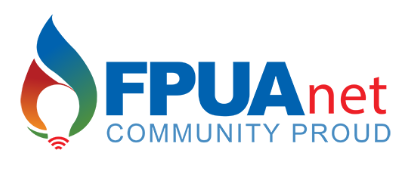
Mittler notes that the finished product should result in both last-mile speeds and pricing that regional telecom monopolies, predominantly AT&T and Comcast, are both unable and unwilling to offer. Especially on the upstream side of the equation.
Mittler says the plan remains to provide all locals with access to symmetrical 100 Mbps for $49 a month; symmetrical 200 Mbps for $69 a month; symmetrical 200 Mbps service for $69 a month, symmetrical 500 Mbps for $79 per month; and symmetrical gigabit for $99 a month.